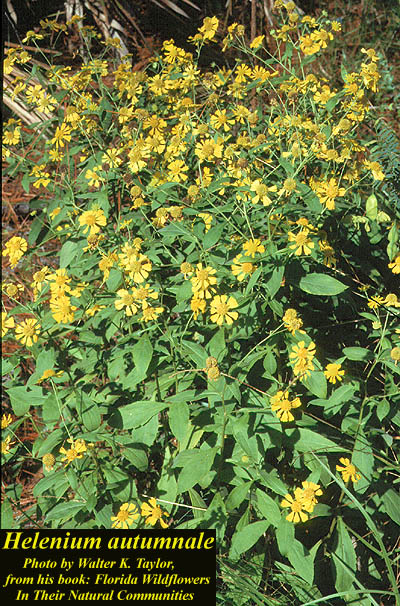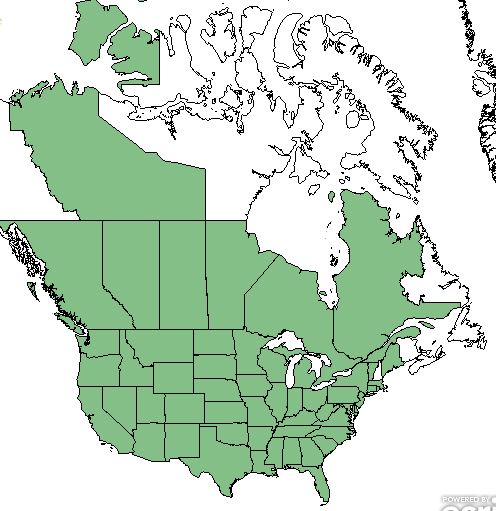Difference between revisions of "Helenium autumnale"
| Line 32: | Line 32: | ||
==Ecology== | ==Ecology== | ||
===Habitat=== <!--Natural communities, human disturbed habitats, topography, hydrology, soils, light, fire regime requirements for removal of competition, etc.--> | ===Habitat=== <!--Natural communities, human disturbed habitats, topography, hydrology, soils, light, fire regime requirements for removal of competition, etc.--> | ||
| − | This species grows in a variety of communities, ranging from moist pastures to forests and woodlands <ref name= "Weakley"> Weakley A. S.(2015). Flora of the Southern and Mid-Atlantic States. Chapel Hill, NC: University of North Carolina Herbarium. </ref>. | + | This species grows in a variety of communities, ranging from moist pastures to forests and woodlands. <ref name= "Weakley"> Weakley A. S.(2015). Flora of the Southern and Mid-Atlantic States. Chapel Hill, NC: University of North Carolina Herbarium. </ref> More specifically, habitats range from shady and loamy sand in mesic hardwoods floodplains, sandy alluvial dikes, drainage ditches, pine flatwood depressions, wet woodlands, wet roadsides, moist soil of limestone bluffs, and other moist sandy loams. <ref name= "Herbarium"> Florida State University Robert K. Godfrey Herbarium database. URL: http://herbarium.bio.fsu.edu. Last accessed: June 2018. Collectors: Loran C. Anderson, Robert L. Lazor, Robert K. Godfrey, D. B. Ward, R. Kral, L. Redfeam, and J. Lazor. States and counties: Florida: Liberty, Jackson, Taylor, Wakulla, Montgomery, Franklin, Gadsden, Calhoun, Holmes, and Gulf. Georgia: Thomas. </ref> |
===Phenology=== <!--Timing off flowering, fruiting, seed dispersal, and environmental triggers. Cite PanFlora website if appropriate: http://www.gilnelson.com/PanFlora/ --> | ===Phenology=== <!--Timing off flowering, fruiting, seed dispersal, and environmental triggers. Cite PanFlora website if appropriate: http://www.gilnelson.com/PanFlora/ --> | ||
Revision as of 19:04, 14 June 2018
Common name: common sneezeweed [1]
| Helenium autumnale | |
|---|---|

| |
| Photo by the Atlas of Florida Plants Database | |
| Scientific classification | |
| Kingdom: | Plantae |
| Division: | Magnoliophyta - Flowering plants |
| Class: | Magnoliopsida - Dicots |
| Order: | Asterales |
| Family: | Asteraceae |
| Genus: | Helenium |
| Species: | H. autumnale |
| Binomial name | |
| Helenium autumnale L. | |

| |
| Natural range of Helenium autumnale from USDA NRCS Plants Database. | |
Contents
Taxonomic Notes
Synonyms: Helenium latifolium P. Miller, and Helenium parviflorum Nuttall
Varieties: none
Description
Also known as the common sneezeweed, H. autumnale is a native perennial forb that is a member of the Asteraceae family. It grows yellow conspicuous flowers and brown inconspicuous fruit [1].
Distribution
H. autumnale can be found across the North American continent, from across the United States to most of Canada [1].
Ecology
Habitat
This species grows in a variety of communities, ranging from moist pastures to forests and woodlands. [2] More specifically, habitats range from shady and loamy sand in mesic hardwoods floodplains, sandy alluvial dikes, drainage ditches, pine flatwood depressions, wet woodlands, wet roadsides, moist soil of limestone bluffs, and other moist sandy loams. [3]
Phenology
H. autumnale typically flowers in the month of September [4].
Conservation and Management
Cultivation and restoration
Photo Gallery
References and notes
- ↑ 1.0 1.1 1.2 USDA Plants Database URL: https://plants.usda.gov/core/profile?symbol=HEAU
- ↑ Weakley A. S.(2015). Flora of the Southern and Mid-Atlantic States. Chapel Hill, NC: University of North Carolina Herbarium.
- ↑ Florida State University Robert K. Godfrey Herbarium database. URL: http://herbarium.bio.fsu.edu. Last accessed: June 2018. Collectors: Loran C. Anderson, Robert L. Lazor, Robert K. Godfrey, D. B. Ward, R. Kral, L. Redfeam, and J. Lazor. States and counties: Florida: Liberty, Jackson, Taylor, Wakulla, Montgomery, Franklin, Gadsden, Calhoun, Holmes, and Gulf. Georgia: Thomas.
- ↑ Panflora URL: http://www.gilnelson.com/PanFlora/